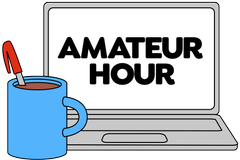Amateur Hour is an advice column for people who are new to the professional world and are figuring out how work even… works.
Advertisement
The problem is, it's hard to put together a resume as a junior widget crafter when no one will admit they'll take one, and very difficult to write cover letters tuned to specific positions when I have no idea how many of their requirements are real and what I might be falling short on. It's also pretty difficult to be confident in interviews when, technically, I'm underqualified for the position. I feel like an impostor. What the heck am I supposed to do?It is very, very common for job postings to vastly overstate the qualifications that are really needed to do the job.Often that’s because job advertisements are sort of like wish lists. They’re the hiring manager’s idea of a dream candidate, but they’d be willing to settle for most of what they listed instead of all of it. Sometimes, too, there can be a disconnect between whoever wrote the ad (maybe HR or a recruiter) and the hiring manager (the person who will be your boss if you’re hired), who doesn’t really care if you have a degree in X, and who knows gizmo levitation hasn’t been around long enough for anyone to have a decade of experience in it.But from the outside, it can be hard to tell which qualifications are flexible and which are more rigid. Still, though, it can help to think of the requirements you see in ads as intended to give you an overall sense of the type of person who would be well-matched with the job. If they ask for 10 years of experience in X and you just started doing X last year, they’re clearly looking for someone more senior. On the other hand, if they ask for 2–3 years of experience with X and you have one year, they’re envisioning a fairly junior candidate and you’re a lot closer to the general ballpark.
Advertisement
As a general rule, if you meet around 80 percent of the qualifications and you can point to evidence showing that you would do the job well, you should go ahead and apply. The exception to that is if one of the qualifications you don’t have is an obviously key piece of the job, like a pharmacist license for a pharmacy job or Spanish fluency for a job editing Spanish-language materials. Otherwise, though, assume 80 percent gets you close enough.Interestingly, there’s a notable gender divide in how willing people are to do this: research shows that men will apply for a job when they meet only 60 percent of the qualifications, but women will only apply if they meet 100 percent of them. A Harvard Business Review piece looked more deeply and found that it’s not that women don’t believe they could do the jobs they’re not applying for; it’s that they assume they have to meet all the qualifications in order to ever be considered. So it’s especially important for women to know that requirements aren’t always true requirements; lots of people apply when they only meet some of the qualifications, and some of them end up getting hired.On top of that, if you get it wrong and apply for a job you’re not qualified enough for, no one is going to be outraged or upset. People apply for jobs they’re not fully qualified for all the time, and hiring managers are used to sifting through applicants who don’t meet what they’re looking for. The worst that will happen is they’ll reject you, and that’s OK!All that said, when you apply to a job you’re underqualified for, you do need to work harder on your application. It’s extra important to write a personalized, compelling cover letter and create a resume that shows a track record of achievement. And when your qualifications aren’t the most competitive at first glance, you’ll be able to make a stronger case for yourself if you take some time to figure out why the hiring manager should believe you could excel at this job. Maybe you don’t have as much experience as some other candidates do, but you live for Excel and do statistical analysis for fun. Maybe you’ve never worked in sales but you do volunteer fundraising calls for your alma mater and you’ve been praised for your ability to connect with donors. Whatever is telling you, Hey, I could be good at this job, spell that out for the hiring manager in your materials and when you’re interviewing. Otherwise you’re relying on them to figure it out for themselves, and they may not do that when they have other candidates who are a more obvious match on paper.Also, if you’re thinking this sounds like a terrible system and it would be better if employers were more deliberate about investing in training people with little or no experience for jobs that are relatively junior anyway… yes. But while this is the system we’re stuck with, this is the way you can navigate it.Get more good advice from Alison Green at Ask a Manager or in her book. Do you have a pressing work-related question of your own? Submit it using this form.
